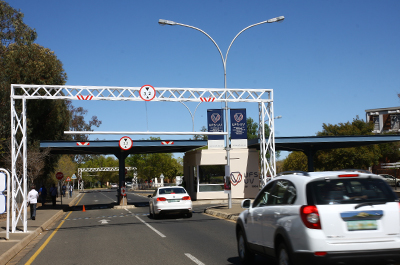 |
Badenhorst gate
Photo: Hannes Pieterse
18 September 2013 |
The University of the Free (UFS) has extended measures to ensure the safety of its staff and students on the Bloemfontein Campus.
Part of this initiative includes the closure of the gate at Badenhorst Street in Universitas near Roosmaryn residence for traffic as from 1 October 2013. Pedestrians who can present a valid student or staff card or any form of official identification will still be allowed to access this gate. No vehicles will be allowed to pass through the Badenhorst gate after this date, though.
In addition, the pedestrian gate at the sports grounds on the western campus will also be closed from 1 October 2013.
The gate at the Agriculture Building in DF Malherbe Avenue will now be closed at 22:00 every night and over weekends, instead of being open 24 hours a day.
Closing these gates forms part of the university’s strategy to increase safety measures on the Bloemfontein Campus. Further efforts will follow to restrict access to the campus – such as the installation of an integrated electronic security systems. An intensive safety awareness campaign aimed at staff and students has also been launched and tips on how to stay safe are extensively being communicated.
Furthermore, the university will have a caravan present at major events to attract attention to security and implement a strategy to make the areas around the Bloemfontein Campus safer for students.